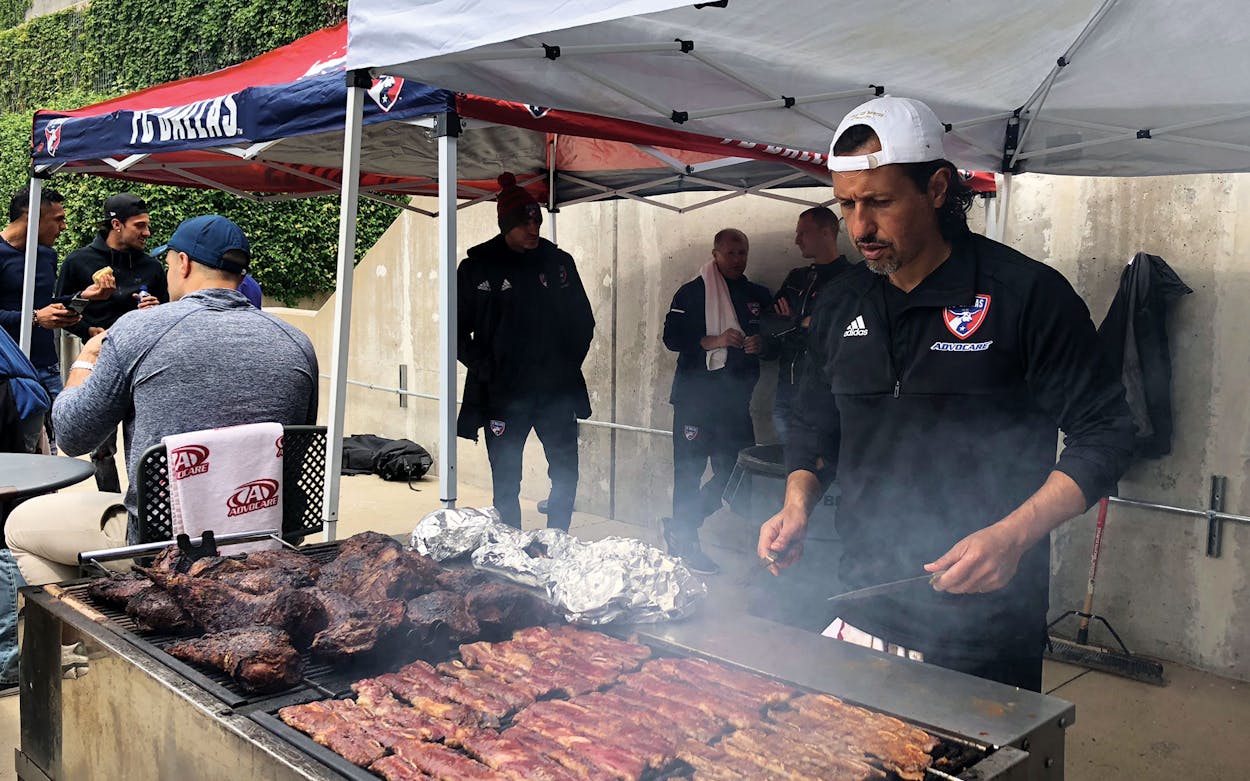There’s always something on the line when the FC Dallas soccer team practices. Practice is of course a chance for individual and team improvement and a chance to vie for more playing time, but there’s also the barbecue fund. As teammates run passing drills, the lowest-scoring duos put in $20 each. The poorest performance in goal comes with the same penalty. And players pay for other reasons, too. Assistant coach Josema Bazan told me, “One guy showed up for practice twenty minutes late” last week. “That’s a full barbecue,” he said, laughing.
After Bazan joined FC Dallas in 2011 as an academy coach, he quickly took over the cooking duties for what was then the coach’s barbecue lunch. He suggested inviting the players to the next one, and a team tradition was born. Now the MLS team’s players and coaches come together about once every three weeks after practice to truly share a meal. Sure, there’s a team meal after every practice, but the players come and go from the lunch room. The player-funded barbecues are different. They’re important as much for the social aspect as the food, but the food isn’t bad either. It’s one of the few times where the players and coaches all occupy the same space outside of practice or a game setting.
A native of Córdoba, Argentina, Bazan grew up cooking barbecue. He learned how to make coals from hardwood, properly grill sausages and beef lomo (tenderloin), and whip up a chimichurri from his mother and his uncle. Bazan has never cooked professionally. His first paycheck came from the Argentinian national team at age 18. He has played soccer professionally in five countries, each one providing a new cooking culture to learn from and further fuel his passion for barbecue.
The smell of beef fat dripping on coals wafted up from the edge of Toyota Stadium in Frisco when I arrived for a team barbecue, at the invitation of Gina Miller in the team’s media department, a few weeks back. Jorge Mercapidez, a Uruguayan friend of Bazan’s, was grilling sausages for sandwiches called choripan. Bazan was wrestling with a mound of beef lomo and picanha. The latter is a cut unfamiliar to Argentinian cooks, but he discovered the prized cut of Brazilian barbecue while playing soccer there. Flanken-cut beef ribs also took up some serious real estate on the charcoal-fired grill. These are thin slices of beef rib cut across the bones that take little time on the grill. Bazan sees it as a functional cut that can feed a crowd quickly if more strangers, like myself, show up for the barbecues. He’s usually in charge of feeding about fifty, but he keenly remembers a day when 97 hungry folks showed up, and his hands were nearly numb from all the meat flipping.


All the meat is simply seasoned with salt and white pepper. Bazan says that pimienta (black and white pepper) is the only thing that’s spicy in Argentinian cooking. Most of the seasoning comes in with the chimichurri, the barbecue sauce of Argentina. Two versions of the oily dressing were available for the team. One was made with olive oil, vinegar, fresh cilantro and oregano, and lots of garlic. The other was more pungent with dry herbs heavy on the oregano. It resembled more closely the version the gauchos would make on long-ago cattle drives. The oil and vinegar they’d mix with the herbs wouldn’t spoil, and they would use the mixture to season their barbecue on the open range.
Bazan prefers his sauces served on the side. My favorite was a salsa criolla made with fresh onions and tomato submerged in a seasoned oil. It was similar to pico de gallo but without the spice. I could tell immediately that I’d like it on a brisket sandwich. I heaped it in my plate, though I was already mostly full from the bites Bazan was feeding me directly from the grill. That’s his favorite part of the barbecue. He likes to see the satisfaction on the players’ faces after a good bite. He likes the cooking, but he’s really behind that grill for the opportunity it gives him to provide genuine hospitality.
It was hard to talk over the grill once the players lined up, so Bazan and I met later for lunch at the Argentinian restaurant Corrientes 348 in downtown Dallas. We discussed barbecue of all types, from Texas brisket to his favorite city in the world for barbecue, Mendoza, Argentina. He enthusiastically showed me photos of his backyard. It’s filled with grills, homemade smokers, and a wood-fired oven. He doesn’t have much need for restaurant barbecue, but we dined on choripán, asado de tira (grilled beef ribs) and bife de chorizo (New York strip). I loved the beef ribs, and he praised the chimichurri.
Bazan said he loves coaching, but he feels like his connection to the players is more than just passing drills and defensive schemes. “They are like my kids,” he said. “Some of them, I’ve had since they were eight and nine.” His cooking is just another way of supporting the team members, and doing it all in a setting where nobody is being judged. Even Josema’s brother, strength and conditioning coach Fabian Bazan, had a full plate and offered no comments on the dietary choices of the players for at least one meal. Some of them may have had a rough practice, but there were nothing but smiles at the team barbecue. Midfielder Victor Ulloa jokingly chastised a few players whose performance sweetened the pot for the next barbecue, and a few others made requests for future menu items. I’ve got my fingers crossed for another invitation, you know, for research.








